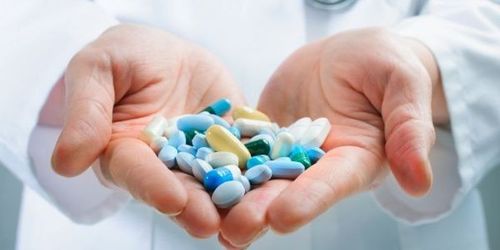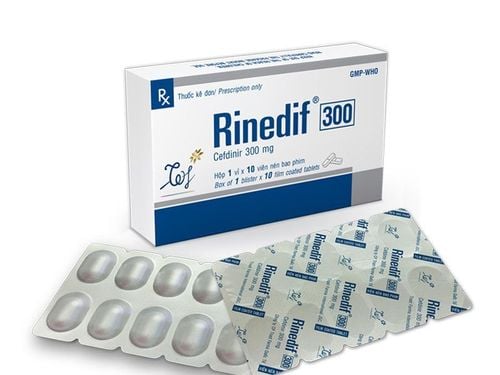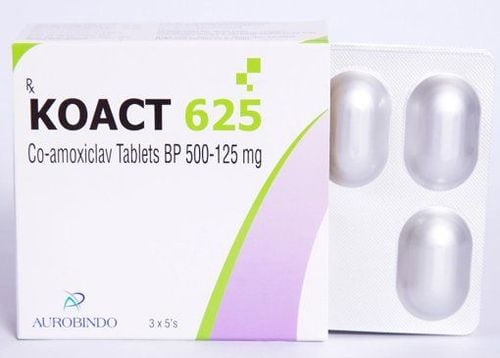This is an automatically translated article.
Cadicefdin with the main ingredient Cefdinir is a semi-synthetic, broad-spectrum antibiotic of the third generation of the cephalosporin group. It is effective in treating common bacterial infections of the ears, sinuses, throat, lungs and skin.
1. What are the effects of Cadicefdin?
What does Cadicefdin do? Cadicefdin has the main ingredient is Cefdinir 300mg, belongs to the group of drugs to treat parasites, anti-infectives, antivirals, antifungals. The drug is prescribed by doctors for use in the treatment of infections caused by susceptible strains of bacteria, specifically:Treatment of pneumonia and bronchitis Treatment of ear and nose infections Throat Treatment of uncomplicated gonorrhea Treatment of genital and urinary tract infections Used in the prevention of post-operative infections Treatment of skin and soft tissue infections The drug is also effective in Treatment of bacterial infections in gynecology such as uterine adnexitis, metritis, Bartholin's gland inflammation. Treatment of folliculitis, boils, impetigo, erysipelas, erysipelas, vasculitis or lymphadenitis, periungitis, subcutaneous abscess, sweat gland inflammation, infectious atherosclerosis, chronic pyoderma . Cadicefdin is also used in the treatment of nephritis - pyelonephritis, cystitis. Note: The antibiotic cefdinir is not effective for colds, flu, or other viral infections. Unnecessary use of the antibiotic cefdinir increases the risk of infection.
Mechanism of action
Cefdinir is an antibiotic belonging to the 3rd generation cephalosporin group, which has bactericidal effects due to its ability to inhibit bacterial cell wall synthesis. Therefore, it has an effective use in bactericidal, treating bacterial infections by interfering with cell wall synthesis and preventing the growth of pathogenic bacteria.
2. Dosage and how to use Cadicefdin
How to use: The drug is used orally, the patient can take it while eating or after eating.
Drug dosage: The dose of the drug depends on the condition of the disease as well as how well the body absorbs the drug, so the patient should follow the dose prescribed by the doctor.
For adults and children over 12 years old, the recommended dose is 1 tablet twice a day, 12 hours apart. Duration of treatment using the drug from 5 to 10 days will be according to the direction of the doctor. For children from 6 to 12 years old: The usual dose is 14/mg/kg/day, the maximum dose is 600mg/day. For patients with renal failure with creatinine clearance less than 30 ml/min, the applied dose is 300 mg/time/day. Note: It is necessary to continue taking cefdinir even if the disease has improved and the patient feels better. If a patient stops taking cefdinir too soon or skips a dose, the infection may not be completely treated and the bacteria may become resistant to the antibiotic.
Contraindications:
Cadicefdin is contraindicated in patients with hypersensitivity to Cephalosporin antibiotics.
3. Side effects when using Cadicefdin
Some side effects that patients may experience during use of the drug such as:
Rare side effects with symptoms of abdominal pain, nausea, vomiting, there is a risk of pseudomembranous enterocolitis. Hypersensitivity reactions such as pruritus urticaria , allergic reactions in the form of a rash. However, patients do not need to worry because these reactions will usually disappear after the patient uses the drug. Very rare reactions such as allergic reactions, enteritis, interstitial pneumonia. Serious side effects may include Clostridioides difficile infection, anaphylaxis, and Stevens-Johnson syndrome.
4. Be careful when using Cadicefdin thuốc
Care should be taken to use the drug with people with a history of allergy to Penicillin Be careful with patients with kidney failure problems: When using the drug, it is necessary to adjust the dose of the drug accordingly. For pregnant women: There are no adequate clinical studies to prove that the drug is safe and does not affect the development of the fetus. Therefore, doctors recommend that these cases should minimize the use of antibiotics. Breastfeeding women: Doctors recommend using the drug only when absolutely necessary when weighing the benefits and harms that the drug brings. The long-term use of the drug can make bacteria resistant to the drug, so it is necessary to monitor the development of the disease closely, if there is reinfection during treatment, it is necessary to change the method of treatment. Other treatments are more appropriate. Use the drug with caution in patients with inflammatory bowel disease.
5. Drug interactions
Before being treated with Cadicefdin, the patient needs to inform the doctor about the drugs he has used or is taking recently, to avoid causing drug interactions that reduce effectiveness or increase reactions. drug side effects.
Combined with iron supplements and iron-containing foods, Antacid (containing aluminum or magnesium) will cause side effects that reduce the absorption of the drug. Therefore, patients should take Cefdinir before or 2 hours after using the above preparations. Probencid: When used together, it increases the absorption of Cadicefdin and prolongs the half-life. Abacavir, Acetaminophen, Aceclofenac, Acemetacin: Cefdinir may decrease the rate of excretion of these drugs, which may lead to higher serum concentrations. Abciximab: The therapeutic efficacy of Abciximab may be reduced when used in combination with Cefdinir. Acenocoumarol: The risk or severity of bleeding may be increased when Cefdinir is combined with Acenocoumarol Acetazolamide: Acetazolamide may increase the rate of excretion of Cefdinir. This may reduce serum concentrations and potentially reduce the effectiveness of the drug Acetylsalicylic acid: Elimination of Cefdinir may be reduced when combined with Acetylsalicylic acid Acyclovir: Excretion of Cefdinir may be impaired decreased when combined with acyclovir. Alteplase: The therapeutic efficacy of Alteplase may be reduced when used in combination with Cefdinir. Cefdinir is a semi-synthetic, broad-spectrum antibiotic belonging to the third generation of the cephalosporin group. It is effective in treating common bacterial infections of the ears, sinuses, throat, lungs and skin. To ensure the effectiveness of treatment and avoid unwanted side effects, patients need to strictly follow the instructions of the doctor, professional pharmacist.
Follow Vinmec International General Hospital website to get more health, nutrition and beauty information to protect the health of yourself and your loved ones in your family.
Please dial HOTLINE for more information or register for an appointment HERE. Download MyVinmec app to make appointments faster and to manage your bookings easily.













